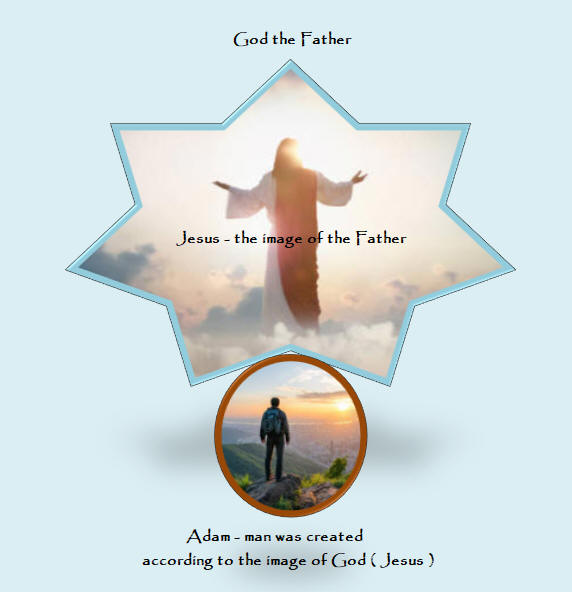
| Orthodox Outlet for Dogmatic Enquiries | Bible |
Adam was made “according to the image of God”
He was not made “in the image of God”
Why is this difference important?

|
The Bible term “according to the Image” refers to the initial stage of
man that enables him to reach the ultimate stage of “according to the
likeness” with the use of free will that was bestowed upon the created
image. However, albeit having given the “image” to all humans, the
“likeness” is the stage that can be attained with the person’s free
will, but only with the synergy of the the Holy Spirit.
But one will probably ask why the Bible says “according to the image”
and “according to the likeness”?
Why doesn’t it say “in the image and the likeness”?
To understand the difference between the usage of “the image” (per se)
and “according to the image”, we could use a simplified example:
Let's imagine an artist who wants to paint a portrait of us.
We would pose before him, and he
would paint a picture of us. The object that he created as he watched us
is referred to as an image of us.
After having painted that image of us and we (the subjects) depart, he
takes that image of us that he painted, places it in a suitable spot,
then, by observing that painting, he makes
a copy of it. This second image that he now paints is not with us
present again, but it is painted exactly like the first image that he
had painted. This second painting is not an image of us having posed
again; it is a painting made “according to the image” that was
previously made of us.
Can you see the difference between the terms “in the image of”
and “according to the image of”?
The former denotes that which is formed or created, based on the
original subject.
The latter denotes that which is created – but NOT based on the original
subject; it was created “according to the image of the
original subject”
So, when we read that God said: “Let us (=the Trinity) make man
according to Our image and according to Our likeness”, He was saying He
would make man according to His image (Jesus) and
according to His likeness (Jesus), and not in the image
and likeness of the invisible-intangible God the Father.
But why is there this difference? Why the discrimination? Why doesn't it
say that we are the images of God, but instead that we are “according to
the image” of God?
Let's try to clarify the difference.
The Bible clearly tells us that God resembles absolutely nothing of His
creations. He is a Being
completely unlike anything we humans have seen and know. How,
then, could an image be formed out of something that is completely
unlike anything we can imagine?
In Isaiah, 46:5 and 40:18,25, it says: “5
With what did you resemble Me”
and “18
with what did you compare the Lord and with what likeness
did you liken Him?”
and “25
and now what did you compare Me to and I have lifted up?”.
And similarly in 1 Timothy 6:16
it says: “Who
alone has immortality, Who dwells in an inapproachable light, Whom
no-one of men has seen, nor is able to see...”
That is why He also said to Moses
in Exodus 33:20: “you
cannot see My person, for no man can see My person and live.”
This is also the reason the Bible says “according to the image” and
“according to the likeness”. Since God is not like anything that we know
and can comprehend, there is no way that we humans could ever be a
direct image of God, nor be directly alike to God in any way – alike to
something that we can't even perceive.
So, since we are created “according to the image” and “according to the
likeness” of God, this clearly hints that there is “something” in
between us and God, which plays a role in the making of our kind. And
this “Something” has to also resemble God, and mankind that can resemble
“It”.
The Bible reveals to us that there is indeed such an image. In
Colossians 1:15, it tells us it is
Jesus Christ:
“Who
is the image of the invisible God, the firstborn of all Creation”.
This reassures us that when it says we are created according to the
image of God, it means we were given the physical form that the (also
beginningless) Christ had taken on, during His incarnation.
Specifically, the “prototype” that God had in His
Mind when creating mankind, was His Son Jesus Christ (after His
enfleshed Birth). And this is precisely why Jesus Christ is not only God
or only a man. The hypostasis of our Lord Jesus Christ is God-human. He
is both God in heaven, but after taking on the human form, He also
became a Man on earth – thus is both God-like and human-like.
If this seems odd to someone (because there were humans on earth before
the Birth of Christ in the flesh), one must remember that God is
beginningless, Timeless. God is beyond Time. To God, our "Present, Past
and Future" are one endless "Present". As
such, it was the pre-eternal will of God that the Son Jesus Christ was
to be the prototype for humankind. Hence, the Son was according to God’s
pre-eternal “design” or “image” - based on Whom mankind was to be
fashioned; and not only fashioned after the Son’s image: also fashioned
to be after the Son’s likeness.
Thus, according to Saint Sophronios, because Jesus Christ is both
God and man, it is for this reason that we can relate to Him and
also become "according to the likeness"of Him.
Translation by A.N. |
Article created on 24-08-2025
Updated on 24-08-2025